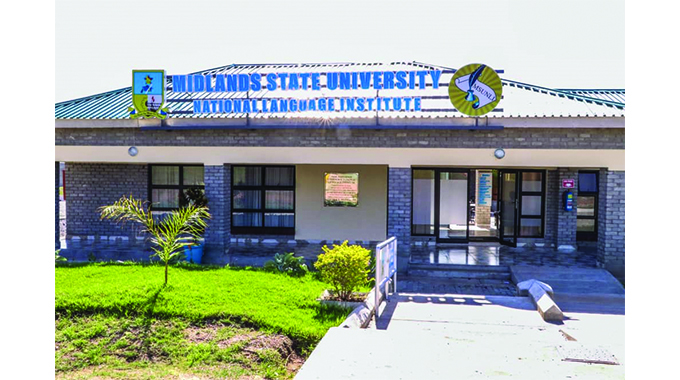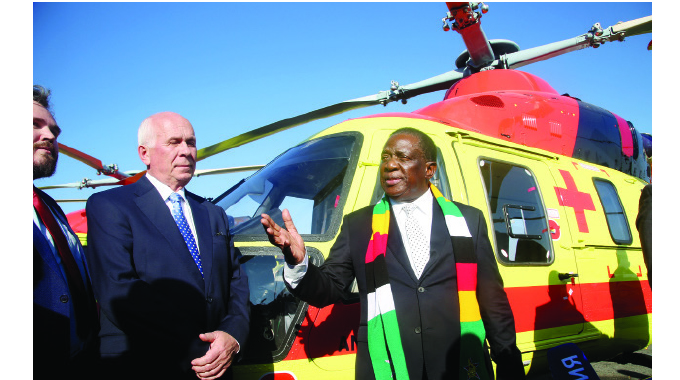WATCH: Midlands State University translates Highway Code into Ndebele and Shona

Patrick Chitumba
[email protected]
IN another milestone, the Midlands State University (MSU) through its National Language Institute (NLI) has translated the Highway Code and provisional driver’s licence examination to Shona and Ndebele.
The Highway Code contains road rules that apply in Zimbabwe and its neighbouring Sadc countries.
The provisional driver’s licence examination, which one has to pass before being tested for the certificate of competency, was only written in English.
The NLI has already translated the National Development Strategy 1 (NDS1) and the new Constitution into 16 languages and is in the process of translating science subjects from primary level as part of the Government’s programme to have sciences taught in local languages.
The NLI, which was officially commissioned at the Gweru Main Campus in May 2019, is set to significantly contribute to the preservation and promotion of indigenous languages and culture.
MSU National Language Institute Executive Director Professor Wiseman Magwa said they had achieved the milestone riding on the Government’s agenda to promote the use of indigenous languages in schools, universities and courts among other public institutions.
“As the NLI, we have the new Constitution which we have translated into all 16 languages. We have translated the Highway Code and the provisional driver’s licence examination into Shona and Ndebele for a start. So if you go to any Vehicle Inspectorate Department (VID) depot you can get your licence in Shona or Ndebele. It’s now possible to use those local languages and people are enjoying it,” said Prof Magwa.
He said with the learner licence examination, one can just click on a language of choice and write the examination.
“It’s happening in Zimbabwe and we are demonstrating that these things are possible,” he added.
The NLI, according to Prof Magwa, is working on translating more Government programmes and policies as well as the national budget from the Ministry of Finance and Economic Development into local languages.
“This way, people will have a buy-in if they understand. So we will assist the RBZ translate policies into local languages. We have done a lot as the NLI and will do more to promote local languages,” said Prof Magwa.
The Government is promoting the use of indigenous languages in schools, universities, and courts among other public institutions with the African Languages Week launch set for MSU on Monday.
The theme for the 2023 edition of the Countrywide African Languages Week is, “African Languages for Sustainable Food Security, Cultural, and Socio-economic Development for the Africa We Want.”
The campaign will be run using the hashtag #WhatWeSpeak and the slogan What We Eat Makes Africa Great!

The month-long cultural celebrations bring to the fore the importance of African languages as the last week of the month has been set aside to celebrate African Languages.
Prof Magwa highlighted that this year’s culture month celebrations will be focusing on the promotion of indigenous languages.
“This May we commemorate Culture Month and we will be celebrating our African Languages. African Languages Week launch has been set for the MSU on Monday. The launch of African Languages is meant to promote the use of African languages in schools, and everywhere and we are saying let us celebrate our culture, let us celebrate our languages,” he said.
“Zimbabwe now recognises 16 official languages including Braille in the new Constitution and I think it’s worth celebrating. So as a university, we are ready and elated to host the event which will be graced by the Speaker of Parliament Honourable Jacob Mudenda.”
Education, the Prof emphasised, can only be meaningfully provided if people communicate in their local languages.
“It’s only here in Zimbabwe where we have this anomaly where we use other people’s languages to educate our children. This was a colonial tool used to suppress us because if you go to China, Germany, or any developed country, it is the mother tongue that is used to educate the children for them to understand any subject,” he said.
In Zimbabwe, pupils start with the English Language battle before getting to the basics of a particular subject.
Prof Magwa said the Government recently approved a budget allocation of US$174 000 for the Strategic Literature Development project that will see science subject textbooks and literature being written and published in indigenous languages.
“Higher and Tertiary Education, Science and Technology Development Minister Professor Amon Murwira said by the end of the year, MSU should have started producing science textbooks and literature using indigenous languages.
So we have a project to translate all science textbooks into local languages and we are starting with the primary schools. We start by identifying the names of things. At the basic elementary level, we give names and they start learning. In Germany, you first learn the language before you do for example engineering,” he said.
Transport and Infrastructural Development Minister Felix Mhona said provisional driver’s licence examinations in local languages had started in the country.
He also confirmed that the Highway Code will be translated into all local languages.
“The provisional licence exam is now being written in Shona and Ndebele, while plans are in place for it to spread across all local languages.
It allows the Citizenry to write and freely express themselves in a language they are comfortable with and it is in tandem with our supreme Constitution of Zimbabwe to align ourselves with the official languages. Above all, people requested for the same and President Mnangagwa listened and implemented,” said Minister Mhona.
In a Post-Cabinet Media Briefing this Tuesday, the Minister of Information, Publicity and Broadcasting Services, Senator Monica Mutsvangwa said the Government is promoting the use of indigenous languages in schools, universities and courts among other public institutions with the African Languages Week launch set for MSU next week.
Lupane State University Department of Languages chairperson Dr Mbulisi Ndlovu said linguistic rights are human rights adding that every human being has a right to receive information in his or her language.
“The majority of our population lives in rural areas where they converse in their mother language almost all the time. If Covid-19 information is conveyed in English, information may not reach the intended audience.
Some people who would be good drivers would fail the provisional driving test because the language used there is difficult for them. So availing study material in one’s language solves that problem,” he explained.
“I believe that most students who fail at school, fail because the medium of instruction is not their mother language. When answering a question, they have to do double thinking, which is to think of the correct answer and to think of the correct way of putting it across in a second language, in this case, English.”
He said the inability to express oneself in English also affects one’s confidence.
“So if learning was to be done in one’s mother language, all these problems would not be there,” said Dr Ndlovu.
ROADS4LIFE Champion for the African Region Mr Tatenda Chokuda said the mother tongue is the language of the soul, the language of emotion, the language which lays bare Ubuntu of people.
“The belief is that such critical documents for life must be understood crystal clear in order to inculcate behaviour change among road users and hence make our roads safer. Last but not least, the use of the mother tongue in such texts about how to save lives on our roads helps eradicate human error due to effective communication. The tragedy with death is not that life is broken but the broken life cannot be resurrected,” he explained.
Mr Chokuda said operating motorised equipment is a psychomotor skills engagement which is not academic.
“It can be done by those with no primary or secondary education, hence vernacular languages help leave no one and no place behind in terms of economic empowerment towards Vision 2030,” he said. —@pchitumba1











Comments